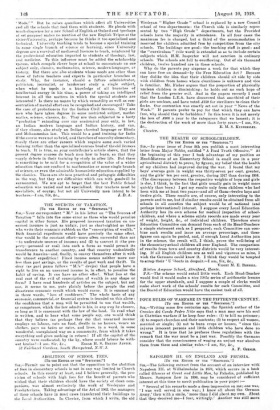ABOLITION OF SCHOOL FEES.
[To THE EDITOR OF THE "SPECTATOR."] SIR,—Permit me to point out that the opposition to the abolition ef fees in elementary schools is not in any way limited to Church schools. In this county at least, and I believe generally, the pro- vision of schools with high fees for the benefit of parents who wished that their children should have the society of clean com- panions, was almost exclusively the work of Wesleyans and Presbyterians. Taking advantage of the Act of 1902, the managers of these schools have in most eases transferred their buildings to the Local Authorities. In Chester, from which I write, the old
Wesleyan "Higher Grade" school is replaced by a new Council school of two departments : the Church side is similarly repre- sented by two "High Grade" departments, but the Provided schools have the majority in attendance. In all four cases the maximum fee is charged, but a third of the accommodation is reserved for children admitted free by competition from the city schools. The buildings are good : the teaching staff is good : and the "curriculum" (vile word) is extended so as to include certain subjects which H.M. Inspector will not sanction in ordinary schools. The schools are full to overflowing. Out of six thousand children, twelve hundred are in these schools.
Why do the parents pay sixpence a week for that which they can have free on demand—by the Free Education Act ? Because they dislike the idea that their children should sit side by side with children from homes where cleanliness is unknown and vice is familiar. Mr. Fisher argues that the proportion of physically unclean children is diminishing: he holds out no such hope of relief from the greater evil. And in the papers recently I read that the London L.E.A. have discovered that one-third of their girls are unclean, and have voted £150 for sterilizers to clean their flocks. Our contention was exactly set out in your "News of the Week." If parents prefer to pay for that which they can have free, why should they be forbidden ? In this town it is not merely the loss of £600 a year to the ratepayers -that we lament; it is the destruction of the work of more than forty years.—I am, Sir,
E. K. S. KYNNERSLEY.
Chester.


































 Previous page
Previous page